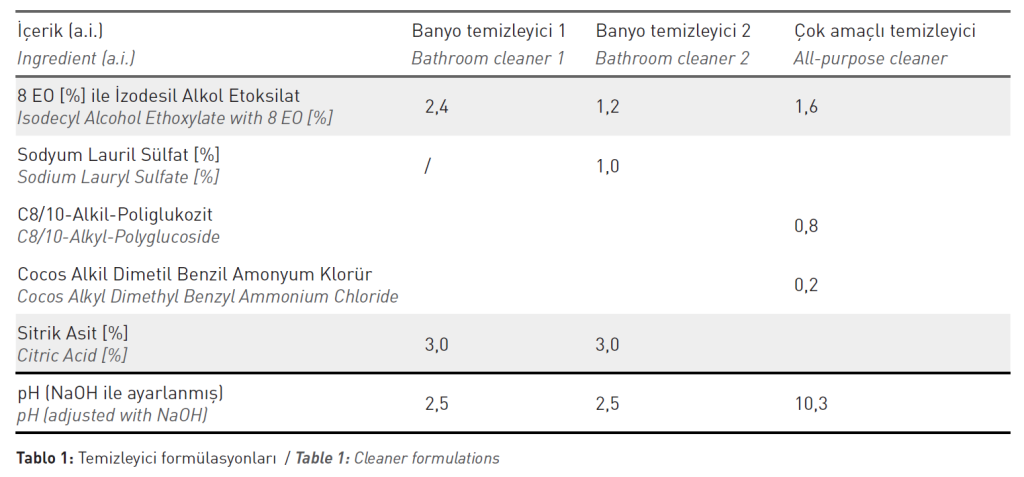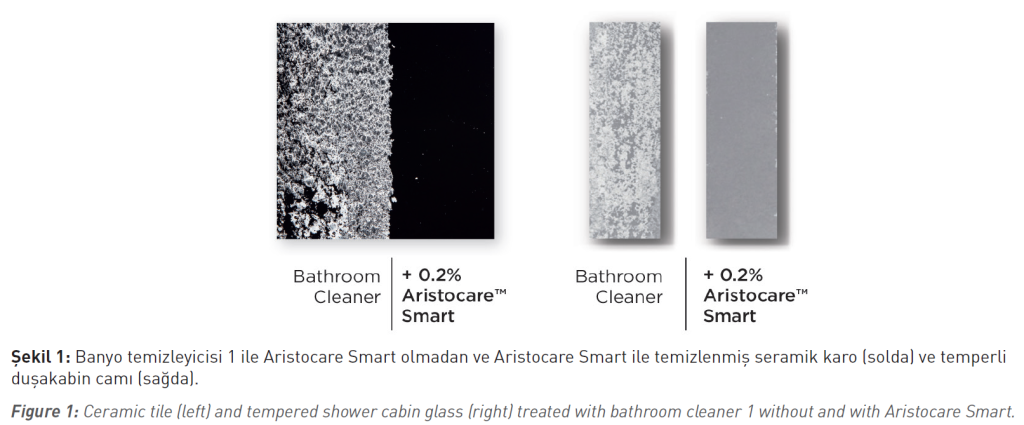Driving Efficiency and Innovation in Hard Surface Cleaning
Introduction
Keeping a home clean is a time-consuming and often strenuous task. As needs in household care point increasingly to improving cleaning convenience, efficacy remains a top consumer expectation particularly when it comes to hard
surface cleaning.
For products within this segment, delivering both efficiency and effective end-results at once creates opportunities for innovation and differentiation. Clariant has developed Aristocare® Smart, a high-performance, multi-purpose hydrophilic polymer that responds to the challenge of making cleaning as efficient as possible.
It enables product brands to take advantage of cutting-edge chemistry developments in order to advance their offerings. Suitable for all types of hard surface cleaner formats, the surface care innovation facilitates new possibilities for products to reduce the time and effort required for cleaning hydrophilic surfaces like ceramics, glass or stainless steel, while delivering high-quality finished results.
Incorporating the additive into formulations is proven to improve performance in the areas of soap scum prevention, anti-streaking, fast water drainage, and limescale prevention.
Smart Action Overview
Aristocare Smart is an easy-to-handle, low-viscosity aqueous solution, which is compatible with cationic, non- ionic and most anionic surfactants. It is stable over a broad pH range 1-12 and in the presence of hydrogen peroxide.
The advanced technology achieves its efficiency benefits by forming a thin protective film layer and that creates a smoother surface. In doing so, it prevents droplets of water and soils from “sticking” to the surface which means that soils can be more easily removed during the next cleaning.
Aristocare Smart hydrophilizes surfaces, which promotes quicker and longer-lasting water drainage away from the smoothed surface. Cleaning products with improved water drainage leave less water residue on surfaces and, as a result, also less spotting once dried.
This novel polymer allows long-term surface hydrophilization, even after consecutive rinsing with tap water, without leading to long-term limescale buildup.
In addition, it supports homogenous distribution of the cleaner, leading to the regular reflection of the light and delivering a streak-free and shiny surface. In the following section, in-application tests using cleaner formulations with and without the additive demonstrate the polymer’s inherent surface modification properties and effectiveness in advancing hard surface cleaner benefits. Base formulations used for the various tests are indicated in Table 1.

Effortless Soap Scum Removal
In an experiment to demonstrate effectiveness against soap scum, 0.2% Aristocare Smart was added to bathroom cleaner 1 (Table 1). Bathroom cleaner 1 was then applied at 0.25g to half sides of black ceramic tiles and tempered shower glass (Figure 1) and spread with a cloth.
The same cleaner was then applied to the other half of the tiles, but this time without the polymer additive. After 5 minutes of drying time, soap scum was applied (in-situ prepared from CaCl2 solution immediately followed by a Na-Oleate solution) and then heated for 1 hour at 60oC. Once the soap scum cooled to room temperature, both the ceramic tile and tempered glass were then rinsed with 100 ml of water.
Figure 1 clearly demonstrates that the area of tile and glass treated with cleaner containing the Aristocare Smart polymer has markedly less soap scum remaining, versus the areas treated with the cleaner without the polymer. This highlights its effectiveness in advancing effortless soap scum removal.
Further testing confirmed that once treated with a cleaner containing Aristocare Smart, resoiled surfaces can be cleaned with minimal effort. Soap scum can be applied 6 additional times, and when rinsed with water, the effect remains evident. The same results occur even with an Aristocare Smart concentration as low as 0.05% with various bathroom cleaners.

Anti-streaking
An assessment of Aristocare Smart’s anti-streaking abilities was also conducted on ceramic tiles. Bathroom-specific and all-purpose cleaners (Table 1) were applied to the tiles and allowed to dry. Upon drying, the tiles were carefully compared and given a visual evaluation rating from 1 to 10, with 10 demonstrating the worst streaking and 1 showing the least amount of streaking.
Results were impressive, the tiles treated with cleaners containing Aristocare Smart exhibited substantially less streaking (Figure 2). The all-purpose cleaner with 0.2% of Aristocare Smart achieved a score of 2.3, versus the cleaner without the polymer which scored 8.7. Bathroom cleaner 2 with 0.2% of Aristocare Smart achieved a score of 3.3, versus the cleaner without polymer which scored 8.0.

The effect could be demonstrated at concentrations as low as 0.05% in various branded cleaner formats.
Fast Water Drainage and Limescale Prevention
The procedure to test Aristocare Smart’s impact on water drainage was as follows. Bathroom cleaner 1 was applied to ceramic tiles (0.5g cleaner per tile) and spread with a cloth 10 times.
After allowing 30 minutes of drying time, the tiles were then rinsed with tap water for 2 seconds (flow rate of 6 l/min 13 - 15° dH) and the drainage time was monitored (Figure 3). The results were striking, with water draining from the tile treated with cleaner containing 0.2% Aristocare Smart rapidly and the effect lasted with 8 additional rinses.
Fast water drainage was also observed on various surfaces like shower heads, stainless steel, shower glass and enamel. Visual evaluation ratings determine the polymer’s effect on combatting limescale. Bathroom cleaner 1, with and without Aristocare Smart as a constituent, was applied to black ceramic tiles.
Repeated applications of hard water followed this, and drying time, with a visual evaluation rating set for limescale build-up of between 1 and 5 - with 1 indicating highly visible scale marks, and 5 no markings (test conducted by Eurofins ATS).
As with the other tests, the cleaner containing the Aristocare Smart was seen to be highly effective scoring a 4.3, versus the cleaner without the polymer at only 2.0 (Figure 4) on black ceramic tiles.
Proof-of-concept
Aristocare Smart has been tested for its adsorption and surface modification properties. Polymer adsorption on glass was studied using a Quartz Crystal Microbalance with Dissipation Monitoring (QCM-D) (Q-Sense E4).
The effects of Aristocare Smart on targeted substrates was investigated by electrokinetic measurements (SurPASSTM3, Anton Paar), contact angle measurements (Krüss DSA 1000), and by atomic force microscopy (AFM) (DI Nanoscope IIIa, Digital Instruments).
Conclusions
Suitable for all types of hard-surface cleaner formats, the Aristocare Smart additive is proven to help formulations maintain the cleanliness of hydrophilic surfaces like ceramics, glass and metals for longer.
Cleaners featuring the polymer are able to deliver effortless effectiveness in combating soils including soap scum and calcareous deposit buildup, and can significantly reduce spotting and streaking from product and water residues.
Acknowledgment: The authors wish to thank Maxim Dirksen and Professor Dr. Thomas Hellweg from Bielefeld University for the Atomic Force Microscopy measurements and Eurofins ATS for the conduction of the limescale prevention test.
Sanem Ağaçkanlı
Technical Application Manager, Middle East and Africa Region
Clariant



 The effect could be demonstrated at concentrations as low as 0.05% in various branded cleaner formats.
The effect could be demonstrated at concentrations as low as 0.05% in various branded cleaner formats.